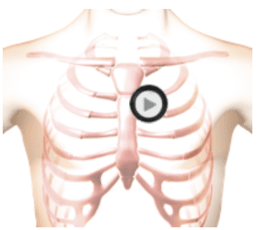Innocent Murmur | Auscultation #11 | Lesson with Audio


The patient was supine during auscultation.
Description
This is an example of an innocent murmur. This type of murmur is seen with non-cardiac conditions such as pregnancy, hyperthyroidism, exercise and anemia. When these are treated appropriately, the systolic murmur disappears. The murmur is heard in early systole, is of short duration and has a frequency range of 120Hz to 250Hz. It is best auscultated in the pulmonic area and increases in intensity with inspiration. It can be heard with either the bell or diaphragm. In this example S1 and S2 are normal. Diastole is silent. The short duration and mid-range frequency characterize an innocent murmur.Phonocardiogram
Anatomy
Innocent Murmur
Authors and Sources
Authors and Reviewers
-
Heart sounds by Dr. Jonathan Keroes, MD and David Lieberman, Developer, Virtual Cardiac Patient.
- Lung sounds by Diane Wrigley, PA
- Respiratory cases: William French
-
David Lieberman, Audio Engineering
-
Heart sounds mentorship by W. Proctor Harvey, MD
- Special thanks for the medical mentorship of Dr. Raymond Murphy
- Reviewed by Dr. Barbara Erickson, PhD, RN, CCRN.
-
Last Update: 11/10/2021
Sources
-
Heart and Lung Sounds Reference Library
Diane S. Wrigley
Publisher: PESI -
Impact Patient Care: Key Physical Assessment Strategies and the Underlying Pathophysiology
Diane S Wrigley & Rosale Lobo - Practical Clinical Skills: Lung Sounds
- PESI Faculty - Diane S Wrigley
-
Case Profiles in Respiratory Care 3rd Ed, 2019
William A.French
Published by Delmar Cengage - Essential Lung Sounds
by William A. French
Published by Cengage Learning, 2011 - Understanding Lung Sounds
Steven Lehrer, MD
- Clinical Heart Disease
W Proctor Harvey, MD
Clinical Heart Disease
Laennec Publishing; 1st edition (January 1, 2009) -
Heart and Lung Sounds Reference Guide
PracticalClinicalSkills.com